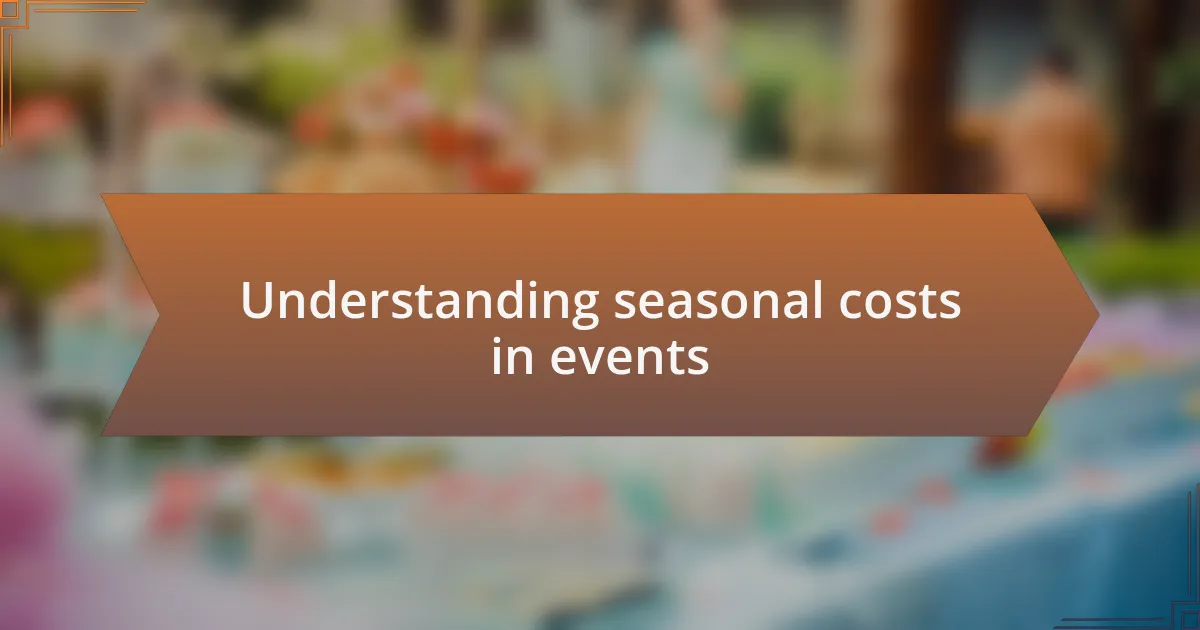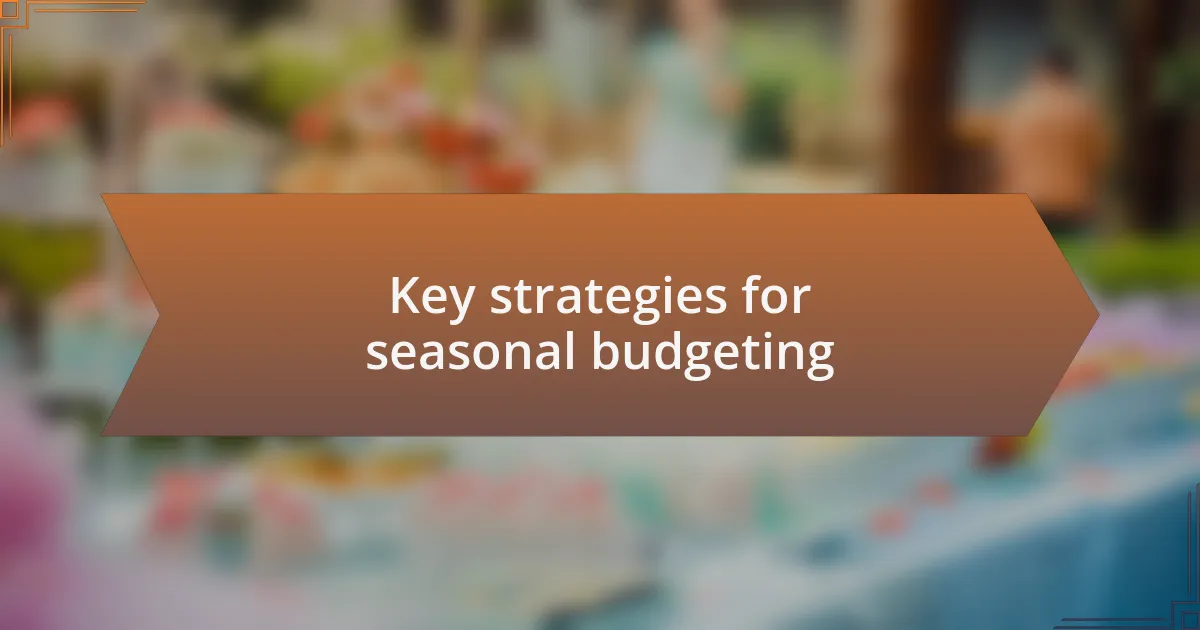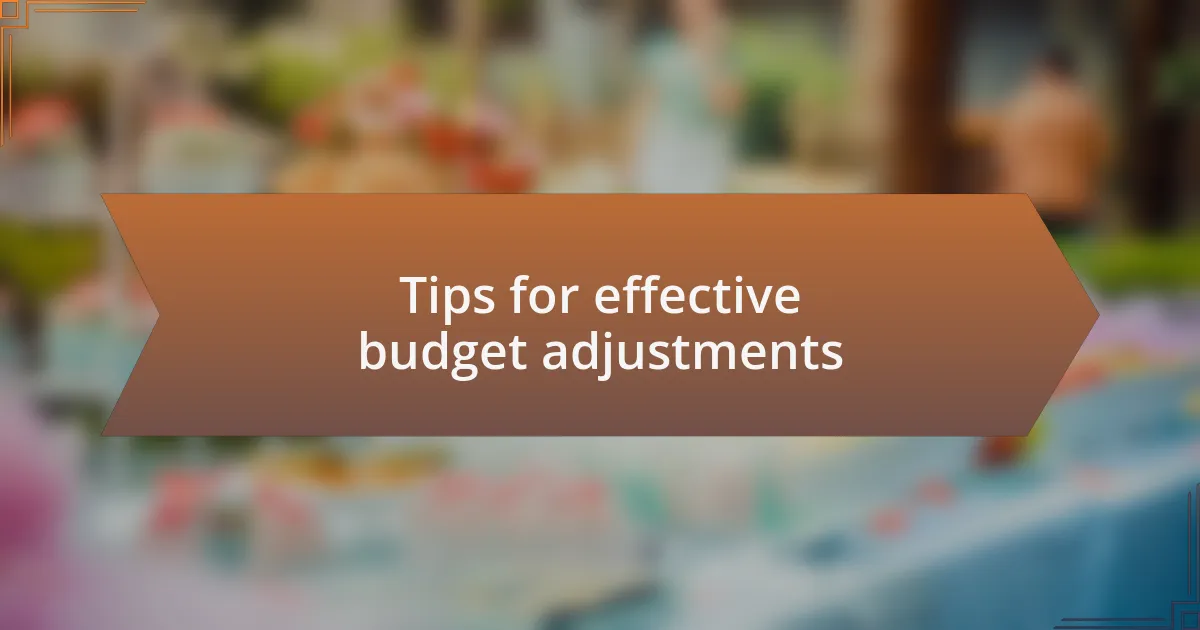Key takeaways:
- Seasonal costs can significantly impact event budgets, influenced by factors like weather and holidays.
- Creating a detailed expense forecast and maintaining flexibility in budgeting can help manage unexpected costs effectively.
- Tracking expenses consistently and reviewing them quarterly enables better decision-making and vendor negotiations.
- Collaborating with the team during budget adjustments often leads to innovative cost-saving ideas.

Understanding seasonal costs in events
Seasonal costs in events can often catch planners by surprise, influencing everything from venue choices to catering options. I remember the first summer festival I managed; we experienced a surge in expenses because of demand for outdoor spaces and increased staffing needs. It made me realize just how crucial it is to anticipate these fluctuations, especially during peak seasons.
One of the most significant factors affecting seasonal costs is the weather. For instance, winter events may require additional heating or even tents, while summer festivals might need cooling solutions. I once underestimated the power of the summer sun, resulting in unplanned expenses on shade structures. Have you ever faced a similar challenge? It’s amazing how quickly seasonal changes can impact your budget.
Moreover, holidays can present both opportunities and challenges for event planning. Think about it: certain occasions come with a spike in costs for decorations and entertainment. I vividly recall planning an event around Valentine’s Day; the flower prices skyrocketed, but creatively incorporating affordable decorations was key. Understanding these seasonal trends not only helps in managing costs but also allows for more strategic decision-making in event management.

Importance of budgeting for events
Budgeting for events is the backbone of successful planning. I can’t stress enough how a well-thought-out budget can act as a roadmap, guiding you through the many decisions that arise throughout the planning process. Consider this: without a clear budget, it’s all too easy to overspend on one aspect and leave yourself short for another critical component. Have you ever felt the panic of realizing that your funds are running dry weeks before the event?
Aligning your budget with seasonal costs allows for smarter allocation of resources. I recall organizing a fall gala where I underestimated expenses for heating and cozy decor; it taught me the value of detailed budgeting. By anticipating these seasonal variations, you not only prepare for unexpected changes but also create a more enjoyable experience for attendees. Can you imagine hosting an event where every aspect was accounted for? It’s incredibly fulfilling to see everything come together seamlessly.
In the realm of event management, budgeting transcends mere numbers; it embodies strategic foresight. Think of all the elements, from catering to entertainment, that can fluctuate with seasons or local holidays. When I faced a spike in venue costs during a summer wedding season, it highlighted the importance of thorough research and adaptability in budgeting. This flexible approach ensures that you’re ready to allocate funds where they’re needed most, ultimately enhancing the event’s quality.

Key strategies for seasonal budgeting
One effective strategy for seasonal budgeting is to create a detailed expense forecast based on past events. I remember when I meticulously tracked costs from previous summers and winters while planning a yearly festival, which enabled me to predict higher expenses for utilities and staffing. This preparation helped me cushion the financial impact and allocate funds more efficiently, proving that knowledge from experience can be your best ally.
Prioritizing flexibility in your budget can be a game-changer. There’s nothing quite like the moment when unexpected costs arise, and you realize that having a contingency fund can save the day. When I encountered surprise fees for additional equipment rentals during a spring event, the flexibility of my budget allowed me to make quick adjustments without derailing the whole operation. How reassuring is it to know that you’ve prepared for the unpredictability of event planning?
Another key strategy is to stay informed about seasonal trends and market fluctuations. In my experience, attending industry conferences has been invaluable, providing insight into changing vendor pricing and emerging trends. This knowledge, combined with regular adjustments to my budget, has helped me consistently enhance the quality of my events while keeping expenses in check. Don’t you think being one step ahead can give you a competitive edge in the bustling world of event management?
![]()
Tracking expenses throughout the year
Tracking expenses throughout the year is like having a personal guide through the ups and downs of event planning. When I first started managing events, I quickly learned that recording every expense in real-time made a world of difference. By keeping a detailed log, I not only spotted trends but also identified those sneaky little costs that could throw the whole budget off balance. Isn’t it satisfying to see how those small, consistent habits can lead to major savings?
Consistency in tracking not only provides clarity but also helps build a financial narrative over time. I recall working on a winter gala where evaluating monthly expenses revealed a pattern of rising decor costs. This insight prompted me to negotiate better rates with vendors and find creative alternatives early on, preventing last-minute financial panic. How empowering it feels to take control of your budgeting by making data work for you!
Lastly, I find that reviewing expenses quarterly offers a fresh perspective. During one particularly busy spring season, I took a critical look at the expenses racked up during the first few months and realized I had overspent on catering. This prompted me to reach out for more competitive quotes moving forward, which not only saved money but also led to exciting new vendor relationships. Wouldn’t you agree that regular check-ins can keep your budget aligned with your evolving event goals?

Adjusting for specific seasonal events
When adjusting my budget for specific seasonal events, I always consider the unique costs associated with each season. For example, during the summer months, outdoor events often require additional expenses for cooling solutions or shade structures. I remember planning an open-air wedding last July, and because I didn’t account for those costs upfront, I found myself scrambling to find last-minute rentals that could accommodate the heat. Have you ever faced similar situations where seasonal demands caught you off guard?
As the fall approaches, I also take into account seasonal themes and décor. I find that attendees often expect decorations that resonate with the time of year, such as autumn leaves or pumpkin arrangements for harvest festivals. For one particular event, the costs for themed centerpieces skyrocketed because I hadn’t included those specific elements in my initial budget. This taught me the importance of researching seasonal trends in advance—what’s your strategy for including seasonal flair without overspending?
Winter brings its own set of challenges, especially with holiday events where catering prices can soar due to high demand. I vividly recall planning a corporate holiday party and being taken aback by the catering quotes, which were nearly double what I had anticipated. It was a valuable lesson in proactive supplier negotiations; reaching out early for quotes helped me secure better rates. How do you prepare for these seasonal spikes in cost, and are you leveraging your vendor relationships effectively?

Tips for effective budget adjustments
When I revisit my budget for seasonal events, one crucial tip I’ve learned is to set aside a contingency fund specifically for unplanned costs. One year, while orchestrating a spring festival, I faced unexpected weather changes that required additional tents and heaters. That extra cushion in my budget saved the day and allowed me to adapt without the stress of scrambling for last-minute funding. How do you ensure you’re ready for the unexpected?
Another effective strategy is to analyze past events and their expenses during the same season. I once reviewed the costs from a summer music festival I organized years ago, and it helped me pinpoint which items consistently exceeded my budget. This reflective practice not only boosted my confidence in future planning but also made me more aware of areas where I could negotiate better deals with vendors. Have you ever tried looking back at your previous events to forecast future needs?
Lastly, I emphasize the importance of collaboration with my team during seasonal budget adjustments. Sometimes, discussing ideas and sharing insights brings forth fresh perspectives. I remember brainstorming session when my colleagues suggested innovative ways to cut costs without sacrificing quality, such as opting for local vendors to reduce shipping fees. What collaborative approaches do you utilize in your budget planning?